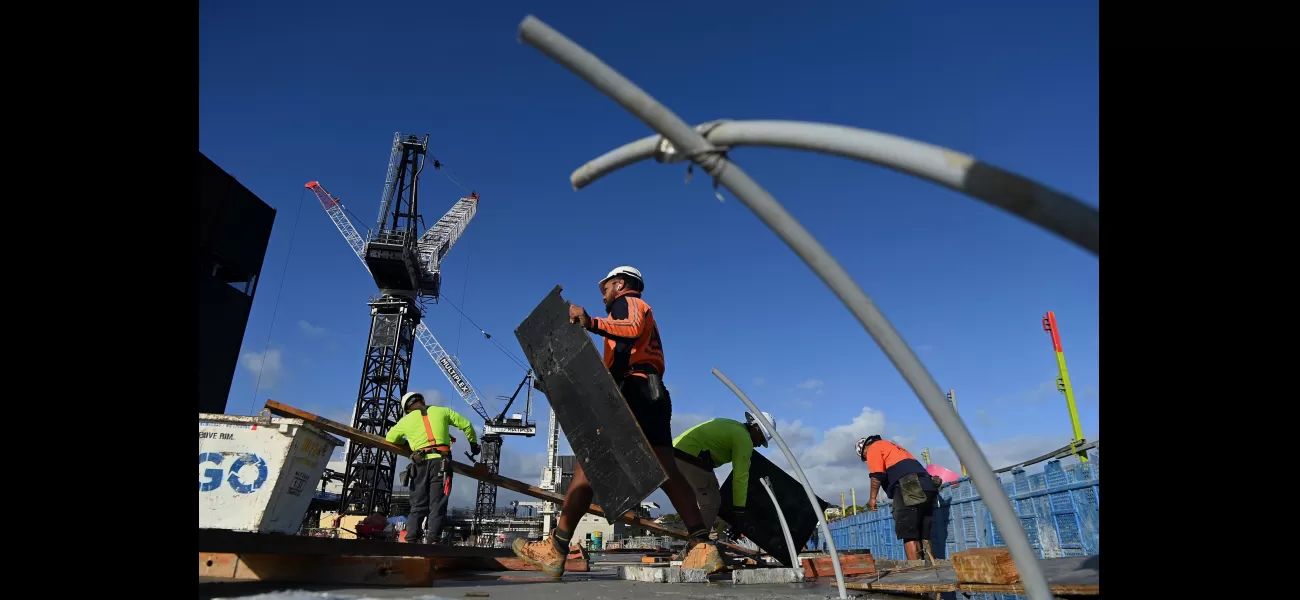The long-feared wave of insolvency has arrived, with construction and hospitality sectors taking a major blow.
Troubling data shows insolvency rates at their peak since 2015.
May 5th 2024.

Australia has been hit hard by a terrifying "insolvency tsunami," according to a recent report by one of the world's leading credit agencies. This wave of financial turmoil has had a major impact on businesses across various industries, but construction and hospitality seem to be bearing the brunt of it.
In fact, insolvencies in Australia have now reached their highest levels since 2015, as reported by Equifax. This is a staggering 41% increase from last year and a massive 145.7% increase since 2022. These numbers are quite alarming, to say the least.
Scott Mason, a representative from Equifax, shared his concerns about the survival of many businesses, particularly small and medium enterprises (SMEs) and sole traders in the construction and hospitality sectors. According to Mason, these businesses are facing significant challenges, with a high likelihood of being in mortgage stress, as evidenced by Equifax's data.
In fact, sole traders in the construction industry are 60% more likely to be in early mortgage arrears compared to the average consumer, while SMEs are 30% more likely. Similarly, sole traders in hospitality are facing a 75% higher risk of being in mortgage arrears. This paints a worrying picture of the financial state of these businesses.
Mason also highlighted the regional disparities in the levels of stress faced by construction sole traders and SMEs. For example, those in Western Australia and South Australia seem to be twice as likely to be in early mortgage arrears, while those in Victoria are 44% more likely. These numbers are concerning and call for immediate attention.
The impact of this financial crisis is also reflected in the average time taken to pay back dues, known as Days Beyond Terms (DBT). According to Equifax's data, the average DBT has increased year-on-year, reaching 6.5 days. This further highlights the financial strain faced by businesses in the construction industry.
In light of these challenges, Mason pointed out that business owners are facing tough decisions, having to prioritize between paying their business or personal expenses. As a result, their mortgage repayments are starting to fall behind.
The construction industry is clearly under immense pressure, and Equifax's report brings to light some of the harsh realities faced by those in the trade. On average, tradespeople are now taking 10.2 days beyond terms to pay their dues, which is a clear indication of the severity of the situation.
In conclusion, this report serves as a wake-up call for Australian businesses, especially those in the construction and hospitality sectors, to take immediate action and find solutions to mitigate the impact of this "insolvency tsunami." The survival of these businesses is crucial for the overall health of the Australian economy.
In fact, insolvencies in Australia have now reached their highest levels since 2015, as reported by Equifax. This is a staggering 41% increase from last year and a massive 145.7% increase since 2022. These numbers are quite alarming, to say the least.
Scott Mason, a representative from Equifax, shared his concerns about the survival of many businesses, particularly small and medium enterprises (SMEs) and sole traders in the construction and hospitality sectors. According to Mason, these businesses are facing significant challenges, with a high likelihood of being in mortgage stress, as evidenced by Equifax's data.
In fact, sole traders in the construction industry are 60% more likely to be in early mortgage arrears compared to the average consumer, while SMEs are 30% more likely. Similarly, sole traders in hospitality are facing a 75% higher risk of being in mortgage arrears. This paints a worrying picture of the financial state of these businesses.
Mason also highlighted the regional disparities in the levels of stress faced by construction sole traders and SMEs. For example, those in Western Australia and South Australia seem to be twice as likely to be in early mortgage arrears, while those in Victoria are 44% more likely. These numbers are concerning and call for immediate attention.
The impact of this financial crisis is also reflected in the average time taken to pay back dues, known as Days Beyond Terms (DBT). According to Equifax's data, the average DBT has increased year-on-year, reaching 6.5 days. This further highlights the financial strain faced by businesses in the construction industry.
In light of these challenges, Mason pointed out that business owners are facing tough decisions, having to prioritize between paying their business or personal expenses. As a result, their mortgage repayments are starting to fall behind.
The construction industry is clearly under immense pressure, and Equifax's report brings to light some of the harsh realities faced by those in the trade. On average, tradespeople are now taking 10.2 days beyond terms to pay their dues, which is a clear indication of the severity of the situation.
In conclusion, this report serves as a wake-up call for Australian businesses, especially those in the construction and hospitality sectors, to take immediate action and find solutions to mitigate the impact of this "insolvency tsunami." The survival of these businesses is crucial for the overall health of the Australian economy.
[This article has been trending online recently and has been generated with AI. Your feed is customized.]
[Generative AI is experimental.]
0
0
Submit Comment





